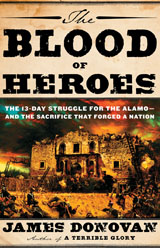
The Blood of Heroes
The 13-Day Struggle for the Alamo—and the Sacrifice That Forged a Nation
By James Donovan. 551 pp. Little, Brown, 2012. $29.99.
Reviewed by William C. Davis
THERE SEEMS TO BE no end of books on the Alamo, and how could there be? Few other stories in the American narrative are so filled with drama, heroism, sacrifice, and symbolism. And in the half century since Walter Lord’s 1961 A Time to Stand appeared to present the last word on the Texas epic, more than enough new sources have emerged to justify many—though not all—of the subsequent retellings of the story.
Now James Donovan’s The Blood of Heroes provides not only a synthesis of previous work but also excellent new material from the byways and nuances of Alamo history. The result is surely the best account to date, one that presents plenty of new insights while acting as a corrective—or at least an alternative viewpoint—to previous accounts.
I won’t retell the Alamo saga—the story of William Travis, David Crockett, James Bowie, and the hardy band of Americans who died in defense of Texas—in this review; anyone would be better served by reading the book, which is indispensable. Donovan combines that vital blend of authoritative scholarship with the vivid writing necessary to make an oft-told tale seem fresh—the greatest challenge to anyone writing about the Alamo, as virtually everyone in Western culture knows how the story is going to end.
The endnotes are among the best things about The Blood of Heroes. Donovan takes the reader along as he thoughtfully analyzes his sources, sifts through conflicting accounts, and explains his choices—a valuable lesson in the pitfalls of even primary sources, especially presumed or claimed eyewitnesses. Anyone who skips the notes misses the chance to observe the creation of historical narrative.
This reviewer’s own Three Roads to the Alamo comes in for some thoughtful reappraisal, and it is hard to argue with Donovan’s insights. In particular, his analysis of the probable Mexican casualties—he estimates losses at 150 dead and 300 wounded—seems very much on the mark, correcting old chauvinism-driven exaggerations of 1,000 or more casualties, and even more conservative recent tallies, including my count of 200 killed.
Of one thing we may be certain: The Blood of Heroes will only be the last word on the subject for a time. A relentless band of students continues the search for new sources. Every year a few more clues emerge, and still we have no sure idea of all that may lurk in those wonderful archives of the Mexican military at Defensa Nacional in Mexico City.
The Alamo story is not over, and likely it never will be. We should all so hope.
William C. Davis, a professor of history at Virginia Tech, is the author of more than 50 books on Civil War and Southern history, including Three Roads to the Alamo: The Lives and Fortunes of David Crockett, James Bowie, and William Barret Travis (HarperCollins).





